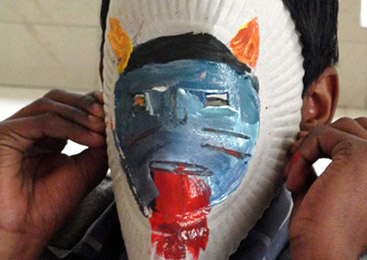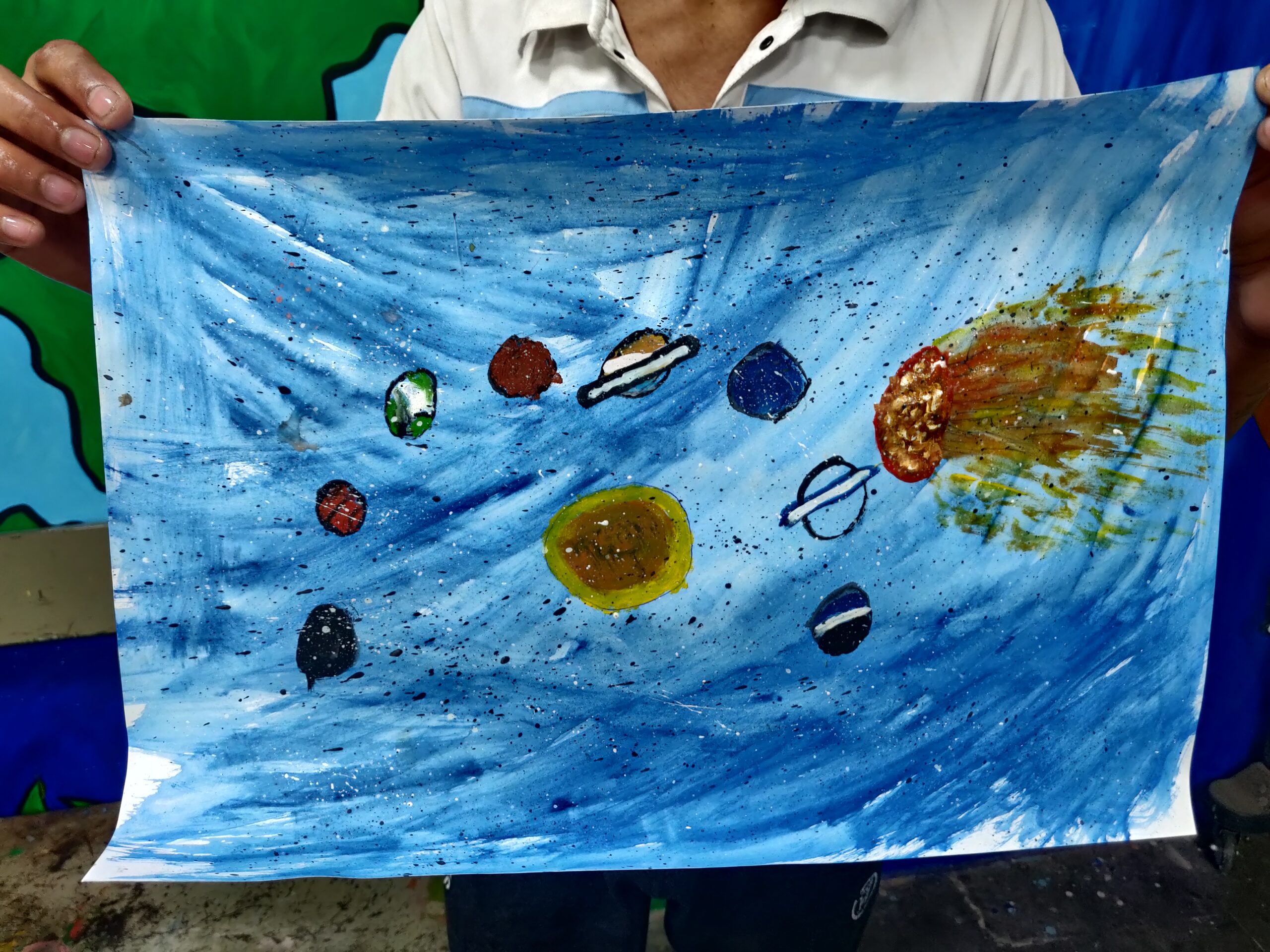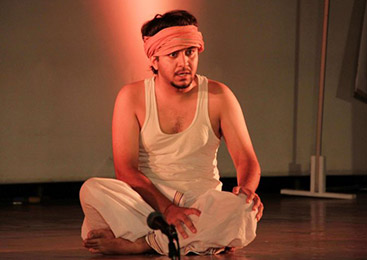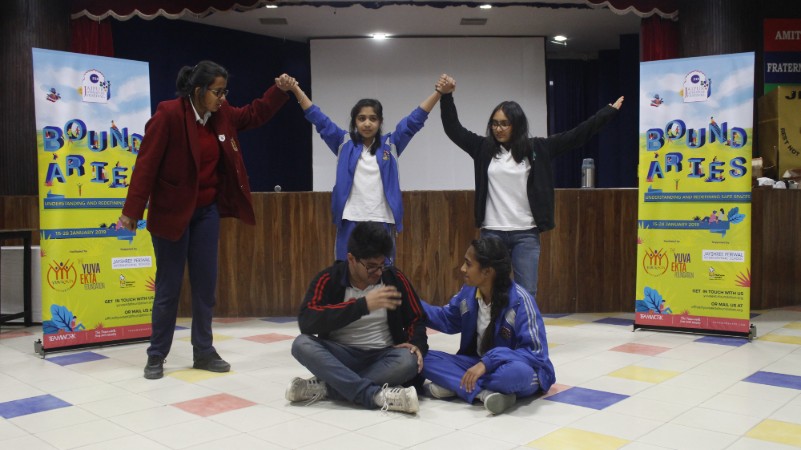Zee Jaipur Literature Festival Youth Outreach Program 2019
January 15th to January 28th, 2019 Jaipur, Rajasthan, India“Now I am in BA 1st year, and finally I am breaking the boundaries shackling me all these years.”
– Roshni and Kiran from Doosra Dashak speak passionately about the boundaries society created for them and how they smashed those boundaries by sheer will and grit. Both of them are now pursuing their ambition to get educated and redefining their Boundaries and Safe Spaces.
“I have finally found a safe space with my family and friends, who don’t judge me and do not slut-shame me.”
– This is the culmination of a really powerful scene, through which our participants focus on their responsibility in making their classroom a safe space where no girl is subjected to character assassination based on her clothes, her relationships, her choice of friends or the pictures she decides to put up on social media.
In its 12th consecutive year of the Zee Jaipur Literature Festival Youth Outreach Program- 2019, The Yuva Ekta Foundation delves deeper into the human psyche to help young people understand personal boundaries and create safe spaces for themselves and others, with its theme- ‘BOUNDARIES- Understanding and Redefining Safe Spaces’.
Personal boundaries are like imaginary bubbles around us. WE decide who to let in and who to leave out.
An effective way of understanding personal boundaries is by recognizing how the body registers feelings of ‘YES’ and ‘NO’. Everyone registers ‘YES’ and ‘NO’ feelings differently.
A ‘YES’ feeling may feel light and uplifting. A ‘NO’ feeling may feel heavy or uncomfortable. Learning to recognize the way ‘YES’ and ‘NO’ feels in the body is a powerful tool to help identify our feelings and speak out, reclaiming our power.
In the light of the current “Me Too” movement it is important to create platforms for such conversations to happen openly amongst youth, setting the foundation of Dignity & Respect as the baseline for every interaction, every relationship.
52 young adults from 5 schools in Jaipur share this platform with 6 NGOs which come from rural areas of Rajasthan and Madhya Pradesh. Whether from an urban or rural background, the aim is to get the young people to become aware of their boundaries, and have the courage and confidence to articulate them. In the workshop, they explore what to do if someone crosses them, how not to feel guilty or embarrassed for doing so, and not to blame themselves for inviting or deserving unwanted behavior.
“In some ways, it looks like Jaipur and other Indian cities have moved ahead of rural areas, but at the very core, there is still a lot of regressive conditioning, and patriarchy still plays a very big role. Although on the outside they look so different, there is this underlying connection that cuts across urban and rural.”
– Puneeta Roy, Founder & Managing Trustee, The Yuva Ekta Foundation
From consent, gender and caste to mental health and body issues, the workshops traversed into complex issues faced by young adults today. As we introduced more and more ideas into the ever-expanding canvas, real stories started to emerge.
As part of the program this year, there is a 3-hour workshop on adolescent sexual health, with The Population Foundation of India. The children afterwards discuss which boundaries the workshop had broken for them. Jasmine (name changed), a young girl from Jaipur had this to say- “It broadened my boundaries about the LGBTQ community, and today I realized I will not judge them in the way I have previously judged them. I have broadened my boundaries.”
The 7-day workshops culminates in an interactive performance titled ‘Meri Seema, Meri Suraksha’, which is performed in 10 schools and a community space in Madhogardh village (about 40 km from Jaipur) before being showcased at SAMVAD stage at the prestigious Festival Grounds. After each performance, audiences are invited to share their personal experiences of rejection and crossed boundaries. One teacher observes, “Since my association with Yuva Ekta, I’ve become a better person. A mirror is held up to how children feel, the turmoil they go through, and it’s made me introspect.” Even two of the school principals share their own experiences of vulnerability and where they had drawn strength from.
Through the Zee Jaipur Literature Festival Youth Outreach Program- 2019, we manage to connect with over 4000 students, teachers, community members and JLF Visitors. We would like to thank Teamwork Arts Pvt. Ltd, Teamwork Fine Arts Society, and The Zee Jaipur Literature Festival for providing us with this platform. We would also like to thank Ms Jayshree Periwal for her lending her support to this program.
MORE ARTICLE FROM OUR BLOG

Volunteer’s Diary- Sahyog
Entering the gates of Sahyog campus triggered a series of emotions in me. Was it anxiety or fear or anger or compassion or curiosity? I don’t know! I entered the campus with an empty mind. I tried not to have any presumed notions about these juvenile offenders. The term ‘juvenile’ is used for person below the age of 18, accused in any crime. Having worked with children before, I believe these children were a little different. However, they were and they did behave like any other child of their age group would have.
Freud’s Psychoanalytic theory suggests that personality is mostly established by the age of five. Early experiences play a large role in personality development and continue to influence behaviour later in life. If these psychosexual stages are completed successfully, the result is a healthy personality. If certain issues are not resolved at the appropriate stage, fixation can occur. Perhaps, this issue makes them different from other children. Dysfunctional family, certain incidents, addiction, poverty, illiteracy, lack of guidance affects them.
Consequently, I was there to grasp and learn all I could, therefore I did not want to talk or do anything. I did not want to interrupt their activities. I just wanted to observe. Observe their actions, reactions.
I was amazed to learn how they had perceived of me as their ‘female’ volunteer, my clothes and my gestures. I was shot at with vulgar comments momentarily. They excelled at playing and twisting my words, so as to change its meaning completely. To their surprise, I was good at dodging them. With my presence, I was determined to bridge the gap. Their constant gaze at me confirmed the urgency of the same. We shook hands, talked, and laughed.
We started with the workshop, with over 30 boys. We worked on painting and decorating matchboxes.
I was happy to see the positive reaction towards the workshop. I took as a sign of acceptance. There were moments of vexation. However, my aim was to read into their minds, rather than sit back out of disappointment. Matchbox was just a medium. Whether they painted it or not, didn’t really matter. Small dusty hands, with chewed nails, scribbling black and white stripes, and then painted it all black, when almost a beautiful unpredictable design was going to come out. Some chose to keep quiet and observe, while some found it impossible to be quiet. I was amused to overhear a myriad of comments.
It was perhaps because of lack of interaction with the other sex. Their curiosity about the other sex is incomplete. Coming from dysfunctional families, the very idea of one’s mother, sister or a friend was still hazy. Most of them come from backgrounds where a casual friendly relation with the opposite sex is stigmatized. There was a tendency in them to emulate all ”film stars” and bollywood actors.
Bruise and cuts on their wrists and arms were enough for me to understand their extent of extreme feelings.
With my presence, I hope to abridge the gap between ‘us’ and ‘them’. They are disheartened and some have lost hope of coming back on track. I don’t want to be an idealist to them, but just wish to expose them to the normalcy of life, be it towards women, elders or law. Their expression in the form of art can be our path into their minds.
– Sanya is a Masters student who has been volunteering with us for a month. This is her feedback from her first session at SPYM Sahyog de addcition home.
READ MORE
Colours of Hope!
The workshop that me and Poorva had thought of did not have a structure. It stemmed from a simple idea: no structure, just boys, paper, and the freedom to let the brush guide them. The world that the boys live in is already structured and bound by rigid rules. Adding more structure would just mimic their daily routine. Imagination is limitless but while talking to the volunteers at the home I realized that imagination can be limited if one is never allowed to explore and think beyond one’s boundaries.
While talking to Puneeta there was a discussion on people who come from outside for workshops can be a sign of hope for the boys. I do not know how I can be a sign of hope at times because I struggle in my daily life to find hope in terms of my future, but maybe because I do not have any literal constraints such as the bars that surround the boys but only the constraints in my mind. Maybe because I can see the sky without any physical/material constraints and can draw the Sonipat skies without having to emphasize the jail bars in my painting. Maybe because for me freedom is easy and taken for granted.
When we started to distribute brushes and paint there was a sense of confusion as the boys had to make their own choice in selecting the brushes like they didn’t know what and how to choose. When we began to paint few of them just sat down and looked at the empty canvas and other the room to search for an inspiration or idea. Some were skeptical to even pick up the brush and start using watercolors because it was new, and no colors appealed to them. Black dominated the palettes of five or six boys. It resonated with me. Why black? What darkness did they find in that shade? Did it grant them the courage to explore other colors, or perhaps express the darkness within them? There I was, surrounded by black, starting my own piece with vibrant reds, pinks, and greens. Paradoxical? Two realities coexist. But slowly, their paintings transitioned from darker shades to a lot of blue, sceneries, and smiley faces in inanimate objects.
I don’t know if the workshop will be fruitful in the long run, but I do hope that their imaginations will not be bounded by constraints of the society and boys will be shackled by the darkness of their past. Like any other teenager, I can only wish for them to find their happiness in the realm of their imaginations if not anything else.
– Eshani Bora, Young India Fellow, Ashoka University
READ MORE
Sweet Reminiscence
What does it take to not forget something? Has it ever happened to you, that when you return from somewhere you have a difficult time adjusting at home? Withdrawal symptoms (as close as it could get) a plenty and you keep asking for more of the same experience. The only thing you think about for sometime is when, where and how you will get an opportunity to go back to the same place and experience something completely new? The true meaning of the term unforgettable is learnt. When you narrate stories of your journey, your mind leaves you gasping for more. Nostalgia, happiness, a weird feeling in the stomach, everything that makes you believe that this journey was special.
I don’t exactly remember when the process started and I certainly know it hasn’t ended. Once upon a time when we only thought we would be in Glasgow one day is now a time, existing, flowing, real and lived. We weren’t tourists (only), our intent was clear. That one hour in which we get to perform our play made the trip of ten days possible. ‘Shoonya se shikhar tak’ is therefore a landmark in my life. The intense training, workshops and preparations for this production has been growing experience. As an actor and as an individual, I have unmasked a lot within me. Shoonya se shikhar tak has not only made me realise the power of my dreams, but also my abilities to work on them. I can proudly say this intensity has made me lighter and stronger at the same time. The magical part is that i dont even know when this process started. It just seems smooth now that I look back on all these memories with fondness.
All of this however wasn’t limited to the one hour in the rotunda. But I think that this growth took a different course from there. Now that I think about it, I can’t find any words to describe my feelings the first time I stepped on the cushioned stage of the rotunda. The first time I ever tested my voice inside that dome, the first time I walked, crossed from one side to the other. Each movement of my body made me want to get that emotion more and more and made me never want to end this experience. And that one hour, when all our rehearsal time, our practise came to its actual test, the hour that made it all possible was an hour that I want to keep reliving. That one hour in which I was vulnerable, both emotionally and physically, on stage and especially off it is the hour I crave. As if that’s the kind of reality I want to keep living. Shoonya se shikhar tak has reached its first shikhar. I think it is time we take it forward, continue to work with ourselves and with this experience and make this journey limitless.
Its not so much about living a dream. It doesn’t hit you always that what you thought of once upon a time, is a reality you’re living. Its after you’re back, trying to adjust with your life that you realise that you just lived what you yearned for. I want to live it again. And keep living it.
For all this and more I would like to extend my heartfelt gratitude to everyone concerned and everyone who made this possible.
“Mere sapnon ka Yeh andaaz hai, ki har rang mein shaksiyat kuch khaas hai.
Mai kehta hoon Bohot ji li zindagi, Woh kehta ki abhi aur Jine ke aas hai.”
– Rijul Kataria works as a Research Coordinator with the Foundation. This blog was written as a part of the Tin Forest International Theatre Festival in 2014
READ MORE




